|
|
 
Status
quiz
Instructions
to students:
In each of the following photos, answer the following questions.
Check your responses with your teacher.
 |
1.
Who has the most power in this picture?
The
female is unaware so she has the least power, and the
man in the fur coat is watching the man with the gun.
Power is given by the focus of the actors. Therefore,
the man on the left of the screen has the most power.
|
|
2.
Why is the man in the fur coat low status? Explain you response
from a blocking point of view and a social point of view.
If
the subject matter of this photo may be considered offensive.
Omit it from your discussions if necessary.
The man in the fur coat is low status because he has been
drinking and is not aware of the circumstances. He is physically
lower, which lowers his status.
|
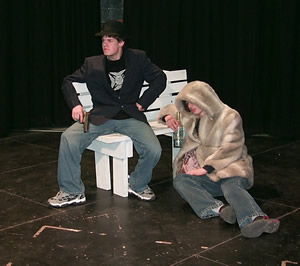 |
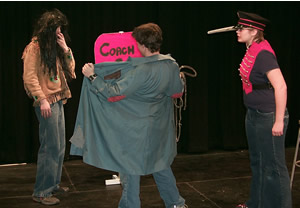 |
3.
Where is the audience supposed to
look in this picture?
The
audience can see both the officer and the flasher facing
the man at the coach stop. He is also the only character
whose front is partially towards the audience. This makes
him the focus.
|
|
4.
Levels are different vertical highs and lows. How are levels
used to create conflict in this picture?
The figures on the right have their arms raised. From
the bottom to the top, the bent over figure is repeated.
In combination with the masks, the sameness of the
characters repeated over height gives the characters power,
and a sense of infinite repetition is created.
|
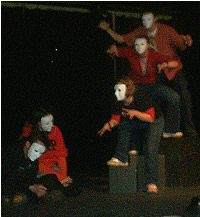 |
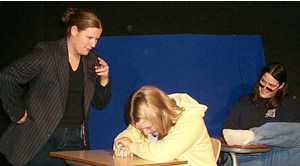 |
5.
Who has the most power in this situation and why? Think
carefully.
Both students are laughing at the adults, who is clearly
trying to have the power, but does not. The posture of the
student in the background gives him the most power. He is
not trying to hide his laughter, but rather, looks relaxed.
|
|
6.
How do the faces of the observers in the background heighten
the conflict in this picture?
Because the observers are open mouthed, clutching clothing,
and pointing, they push the audience's attention to the
foreground and the sword fight. The high tension in the
background increases the tension in the scene.
|
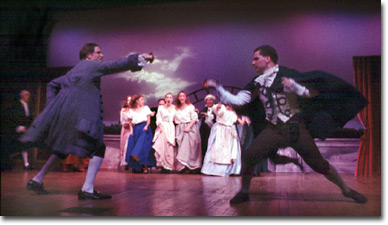 |
|
|
|
Return
to Student Lesson / Return to Teacher
Lesson
|
|
|




